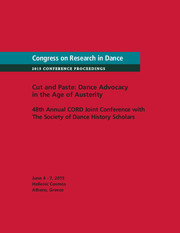No CrossRef data available.
Article contents
Postural Configuration as a Missing Element in Reflective Epistemology
Published online by Cambridge University Press: 04 January 2013
Abstract
Kinsella's metaphor of embodied reflection is extended into the context of performance pedagogy by exploring the implications of the work of F. M. Alexander in Dewey's notion of reflective thinking and the influence of Dewey's work on later thought on reflective practice. The perspective is that an experiential form of knowing underlies Deweyan reflection, which, if integrated into performance and its pedagogy, results in a different kind of qualitative value of both. Such integration could add to the concept of a critical and reflexive pedagogy, which “reflects the complexities of the interactions between teaching and learning.”
- Type
- Panel: Toward a Philosophical Approach to Dance Practice and Pedagogy
- Information
- Copyright
- Copyright © The Author(s) 2009




